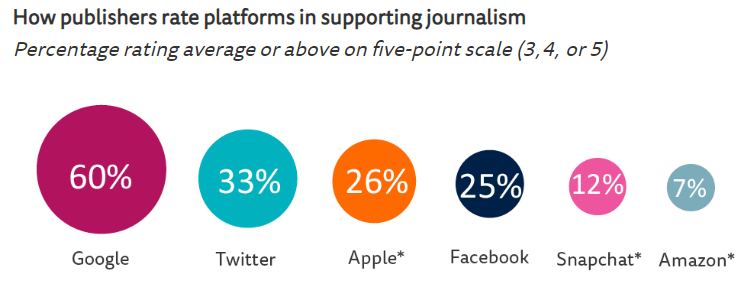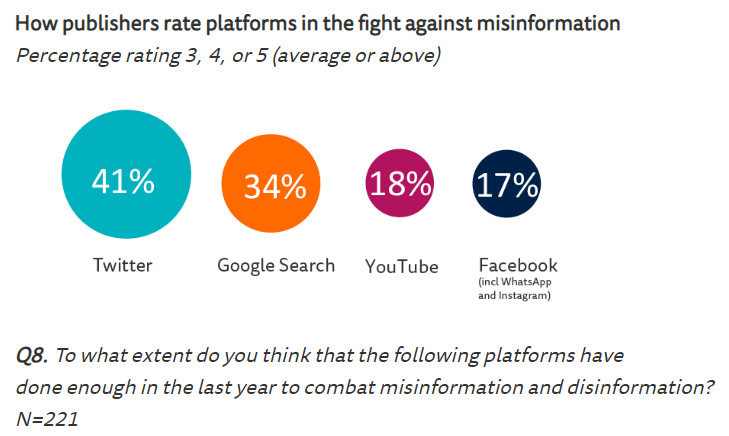
Fighting back against “cynicism and negativity” is likely to become an even bigger theme for the media industry this year, according to a look-ahead at 2020 by the Reuters Institute for the Study of Journalism.
More than half (53 per cent) of the top digital media bosses surveyed for the institute’s annual Journalism, Media and Technology Trends and Predictions report believe the news media should do more to call out misleading statements and half-truths by politicians.
But they feared that fact checking, an area of journalism that has grown since 2016 – the year of the Brexit referendum and Donald Trump’s election – were not having “any impact on large parts of the public”.
BBC World Service controller Mary Hockaday told the survey: “We certainly need to offer fact checks and reality checks.
“But we also need content which explores good faith politics, what might be working, how policy develops and makes a difference. Otherwise we will push our audiences to disengage and distrust politics even more.”
Vogue and GQ publisher Conde Nast’s head of audience growth, Sarah Marshall, said she worried about “reader fatigue and news avoidance” more than ever before, adding: “Clearly this is a problem for democracy and debate, not just for the industry.”
The institute surveyed 233 digital leaders, a quarter of whom were from the UK and the rest from 31 other countries. They included 48 editors in chief, 30 heads of digital and 26 chief executives or chief operating officers.
The report, authored by Nic Newman, said: “The issues of disengagement and news avoidance are a growing concern for many executives. Countering cynicism and negativity is likely to become a more important theme for journalists in the year ahead.”
The report found that although the next decade in journalism is likely to be “defined by increasing regulation of the internet”, most editorial bosses are sceptical about whether policy interventions will actually help them.
More than half (56 per cent) said they did not think changes in the law would make any difference in 2020. A quarter said they would hurt the industry, and just 18 per cent said they would help.
This is despite publishers remaining “resentful about what they see as unfair competition from platforms and tech companies”, the report said, adding that media groups are likely to be seen sticking up for their rights more than ever this year as internet regulation policies loom.
The UK Government proposed a new online regulator in its Online Harms White Paper last year that would impose a statutory “duty of care” on firms that “allow users to share or discover user-generated content or interact with each other online”.
Asked to what extent they thought Google, Facebook, Twitter, Apple, Snapchat and Amazon had “done enough to support journalism”, publishers rated Google as the top platform (60 per cent).
By comparison 33 per cent said Twitter had done enough to support journalism, followed by Apple (26 per cent), Facebook (25 per cent), Snapchat (12 per cent) and Amazon (7 per cent).

To what extent do you think that the following platforms have done enough to support journalism Picture: Reuters InstituteBut a large number of publishers involved in the survey have received money from Google’s news innovation funds, Reuters Institute said.
The report found journalists are just as critical of tech platforms as they are of politicians when it comes to misinformation and disinformation.
Fewer than one in five publishers (17 per cent) said Facebook had “done enough in the last year to combat misinformation and disinformation”.
This is despite a number of efforts by the social network to combat so-called “fake news”, including appointing fact-checking charity Full Fact to review content posted on its News Feed and a move to make political adverts more transparent.

Reuters Institute report graph on how platforms have tackled misinformationThe Reuters report said: “The last ten years were defined by the twin technological disruptions of mobile and social media, which fragmented attention, undermined advertising-based business models, and weakened the role of journalistic gatekeepers.
“At the same time, social and political disruptions have affected trust in journalism and led to attacks on independent news media in many countries.
“The next decade will be defined by increasing regulation of the internet and attempts to re-establish trust in journalism and a closer connection with audiences.
“It will also be rocked by the next wave of technological disruption from AI-driven automation, big data, and new visual and voice-based interfaces.
“All this against a backdrop of economic and political uncertainty which will throw up further challenges to the sustainability of many news organisations.”
In some of the report’s other findings:
- Almost three-quarters (73 per cent) of respondents are confident about their own company’s prospects for 2020, but less than half (46 per cent) are feeling confident about journalism in general
- The number of digital leaders expecting subscriptions and memberships to be their main income stream has gone down slightly in the past year, from 52 per cent to 50 per cent. Just over a third (35 per cent) see advertising and reader revenues as equally important, while 14 per cent still see advertising as their main money-maker
- More media consolidations are expected, with buyers set to focus on keeping titles “distinct while integrating back-end systems like technology, data, and ad tech”
- Publishers will push registration and log-in strategies more “aggressively” in response to data privacy regulation and tightened restrictions on cookies on some browsers
- The most important editorial use of artificial intelligence will be automated recommendations (seen as very important by 53 per cent of digital leaders), followed by commercial uses such as targeting potential subscribers and optimising paywalls (47 per cent), newsroom efficiencies such as tagging and transcribing (39 per cent), and newsgathering (16 per cent)
- Another “big year” for podcasting is expected, with over half of respondents saying they would be pushing various types of podcast initiative.
Picture: Pixabay
Email pged@pressgazette.co.uk to point out mistakes, provide story tips or send in a letter for publication on our "Letters Page" blog
